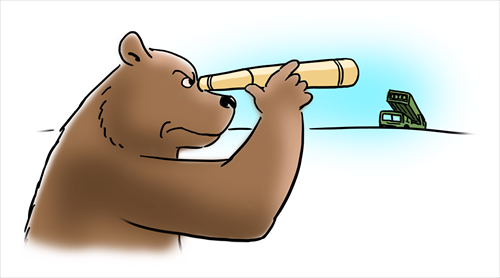HOME >> OP-ED
Deployment dents Russia’s plan to develop far east
By Cui Heng Source:Global Times Published: 2016/7/17 18:58:01

Illustration: Liu Rui/GT
Earlier this month, the US and South Korea announced they will deploy the Terminal High-Altitude Area Defense (THAAD) missile defense system. The US has long wanted to deploy anti-missile systems in Northeast Asia, and now this will become a reality.The deployment of THAAD matters to the security balance in the region and concerns the strategic position of big powers such as the US, Russia, Japan and China. Therefore, the news has been met with strong objection from China and Russia.
Russia reacted more strongly than China. The Russian Foreign Ministry explicitly accused the US of "negatively affecting global strategic stability." Russia may deploy additional missile systems to the Far East, including on the Kuril Islands, in response to the THAAD deployment.
Russia's strong reaction is unsurprising as anti-missile systems will shake Russia's strategic basis in its east. Since the end of the Cold War, Russia's national strength has declined. The cost of maintaining all-round tenacity is too much to bear.
From Boris Yeltsin to Vladimir Putin, Russia has focused its national security strategies on Europe, while the pillars of its eastward strategies are the balance of military power among major powers in Northeast Asia and the relatively stable security pattern after the Korean War (1950-53).
What infuriates Russia is that THAAD will weaken these two pillars which will consequently threaten its national security. The THAAD deployment will grant the US and its allies more strategic deterrence capabilities than Russia. Despite several rounds of military reforms, Russia does not have an upper hand in its conventional weapons. It has been engaged in developing nuclear deterrence to ensure its military security.
To keep the military balance in Northeast Asia, Russia can only rely on its deployed strategic weapons. The Russian elite is aware of the real purpose of THAAD, which is to intercept Chinese and Russian ballistic missiles. Its 2,000 kilometer-range will enable THAAD to cross Eurasia and cover major cities and industrial and military bases in Russia's Far East.
In addition, the THAAD deployment will fundamentally change the regional security architecture established after the Korean War.
Although the Cold War has been over for more than two decades, the security pattern in Northeast Asia is still shaped by the period. The US, Russia and China have agreed to maintain regional security. When frictions occur between Pyongyang and Seoul, they stand up to avoid the conflicts spiraling out of control. When Pyongyang becomes a destabilizing factor, the three countries will act to constrain it.
Stability is the primary objective of the security pattern in Northeast Asia, but the deployment of anti-missile systems will turn North Korea's nuclear issue into an uncertain element.
North Korea develops its nuclear weapons using the excuse of national survival, while the THAAD deployment serves as another reason for its nuclear ambitions. Meanwhile, as the deployment of THAAD weakens the strategic advantages of China and Russia in the region, it also impairs their intervention capability in North Korean affairs.
In other words, as disorder in Northeast Asia deepens, the US and South Korea have agreed to deploy THAAD. If China and Russia cannot manage North Korea's concerns, how will Pyongyang see the two's clout in the region?
Russia has implemented eastward strategies since 2012. According to Sergey Karaganov, honorary chairman of the Presidium of the Council on Foreign and Defense Policy, the strategies do not aim at making Northeast Asia a second battlefield with Western countries; rather, Russia wants to use the development of its Far East as a chance to ease relations with the West.
Even after the Ukrainian crisis erupted and Western countries imposed sanctions on Russia, Russia did not give up this idea. It has engaged actively with Japan and South Korea to boost development in the Far East. After the THAAD deployment, Russia's economic cooperation with Japan and South Korea is bound to be affected, which will further dent Russia's plans in its Far East.
Moscow will not sit still in face of provocations from Washington and Seoul. It is expected that Russia will adjust its national security concepts, and extreme countermeasures will not be excluded.
The author is a PhD candidate at the Center for Russian Studies, East China Normal University. opinion@globaltimes.com.cn
Posted in: Viewpoint